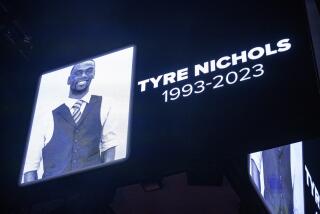LAPD seeks to fire two officers over coerced sex
- Share via
Los Angeles police officials are seeking to fire two officers after an internal investigation determined that they pressured women to engage in sex acts with them in their car while on duty, sources said.
The officers, James Nichols and Luis Valenzuela, have been ordered to appear at disciplinary hearings, where it will be decided whether to fire them. Through his attorney, Nichols denied wrongdoing. Neither Valenzuela nor his attorney could be reached.
Although department officials have remained tight-lipped, the allegations against the officers are detailed in a search warrant affidavit filed by an investigator involved in an ongoing criminal investigation into the officers’ conduct.
Nichols and Valenzuela preyed on at least four women over several years when they worked together as narcotics officers in the LAPD’s Hollywood Division, the warrant affidavit said. The officers had arrested the women or used them as informants before targeting them, according to the affidavit.
After using the threat of jail to get women into their car, the officers sometimes drove them to secluded areas where one of the officers demanded oral sex or other acts while the other kept watch, the warrant affidavit alleged. In other cases, the men acted alone, the warrant said.
Sources familiar with the case, who requested that their names not be used because police personnel matters are confidential, said police officials determined from the investigation that there was enough evidence of misconduct to have Nichols and Valenzuela fired.
Under city rules, the chief of police does not have the authority to fire an officer outright. Instead, Chief Charlie Beck ordered discipline hearing panels that will decide if the officers are guilty of the allegations and, if so, whether they should be fired or given a lesser punishment.
Valenzuela, a 16-year department veteran, and Nichols, who has been an officer for nearly 13 years, were suspended with pay during the investigation. They are no longer being paid as they await the disciplinary hearing.
Beck declined to comment, citing the confidentiality of the proceedings.
Separate from the internal inquiry, investigators are continuing to gather evidence in a criminal investigation. The district attorney’s office ultimately would decide whether to file criminal charges.
In the warrant affidavit, investigators made mention of four woman they identified who made similar, independent accusations against Nichols and Valenzuela, both 41.
Robert Rico, Nichols’ attorney, said the women “have no credibility.”
One of those women has filed a civil lawsuit against the officers. During a deposition in that case, Valenzuela refused to answer questions about the allegations, deciding instead to invoke his constitutional right against self-incrimination, according to Donald Cook, an attorney for the woman. Nichols has not been deposed.
The Times in general does not name alleged victims of sex crimes.
Cook, as well as attorneys for a man who has sued Nichols in an unrelated case, have sought court orders in recent months that would compel The Times to provide them with copies of the search warrant affidavit. The warrant was sealed by a judge at the LAPD’s request after The Times obtained the affidavit from court records.
The first woman to accuse Valenzuela and Nichols came forward in January 2010, when she told a supervisor in their narcotics unit that the officers had stopped her more than a year earlier, according to the warrant.
The woman, who according to the warrant affidavit worked as a confidential informant for the narcotics unit and knew the men, said they were dressed in plain clothes and driving a Volkswagen Jetta. Valenzuela threatened to take the woman to jail if she refused to get in the car, then got into the back seat with her and exposed himself, telling the woman to touch him, the affidavit said.
A year later another woman made a nearly identical allegation, according to the warrant affidavit.
For reasons not explained in the warrant, the department’s investigation made little progress for the next 18 months. During this time, police records show, the officers were transferred, with Valenzuela being reassigned to the Olympic Division and Nichols to the Northeast Division.
Then in July 2012, investigators heard reports from prostitutes that patrol officers in the Northeast Division were picking up prostitutes and letting them go in exchange for oral sex, the warrant affidavit said.
It is not clear how, but an investigator reportedly identified two more women who reported encounters in which Nichols and Valenzuela sought sexual favors in exchange for leniency.
One said Nichols detained her in July 2011, handcuffed her and drove to a quiet location. Removing the restraints, Nichols exposed himself and said, “You don’t want to go to jail today, do you?” the woman recalled, according to the affidavit.
More to Read
Sign up for Essential California
The most important California stories and recommendations in your inbox every morning.
You may occasionally receive promotional content from the Los Angeles Times.









